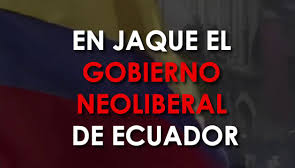
By Roberto Morejón
The violence of organized crime, the consequences of the declared internal armed conflict, the rivalries between the President and the Vice President, the conflict with Mexico and the irritation over the announced elimination of a subsidy, keep the government of Ecuador in check.
The predicted end of the official gasoline subsidy was the trigger for announced protests and marches by unions and other organizations, in a country in which previous decisions of this type caused commotion.
From the Carondelet Palace, headquarters of the executive, they argue that eliminating the fuel subsidy is a key piece to reduce Ecuador's large fiscal deficit.
The planned elimination of financial protections for fuels seems to be in line with Ecuador's granting of a loan from the International Monetary Fund of 4 billion dollars.
The tension over fuel comes in the midst of growing violence, culminating in the promulgation of the internal armed conflict.
According to human rights organizations, this statement contributed to serious human rights violations by security forces in their confrontation against 22 organized crime groups operating in Ecuador.
While the government claims a decrease in homicides, there is talk of an increase in extortions and kidnappings.
In this climate of turmoil, President Daniel Noboa gave the unusual order to the police to break into the Mexican embassy in Quito on April 5, to forcibly remove former vice president Jorge Glas, who had received asylum.
The invasion, condemned internationally, led Mexico to break relations and present the case at the International Court of Justice.
Without time to weather the storm due to the diplomatic incident, Noboa does not reduce his rivalry with Vice President Verónica Abad, with whom he has not spoken, according to journalistic versions, since the last elections.
The stubbornness will have ramifications in the National Assembly, as a judge requested authorization to criminally prosecute Abad for the crime of concussion in the so-called Nene case, regarding alleged influence peddling.
In the opinion of the accused, the actions respond to persecution by the government because, she says, Noboa resists handing over the presidency to her, before joining the campaign for the 2025 elections.
Confident in foreign support and in what he describes as his ability to overcome his setbacks, the Ecuadorian government seems very busy in its role as fire extinguisher.

